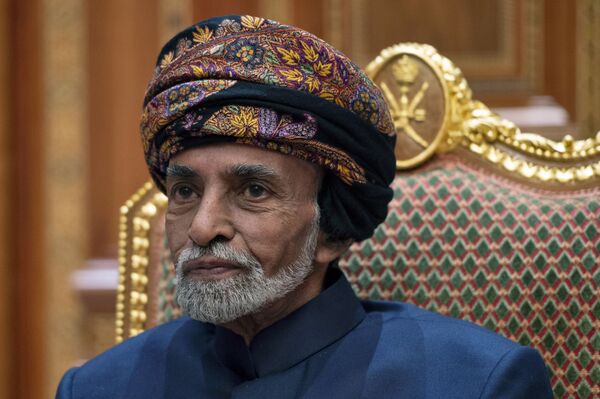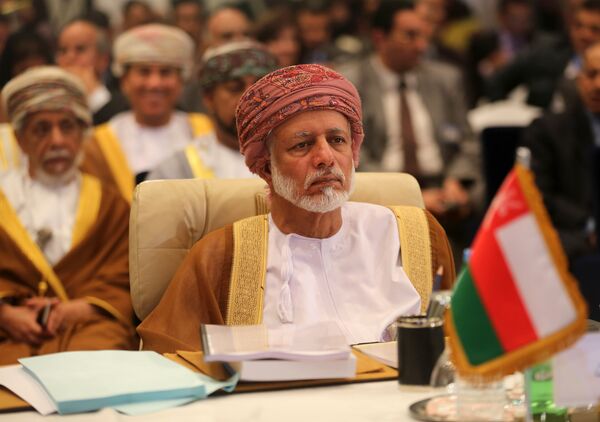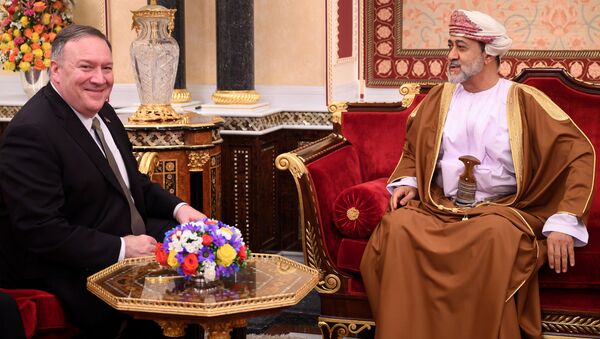After the Sultanate of Oman openly praised the conclusion of peace pacts between Israel and the monarchies of Bahrain and the United Arab Emirates (UAE) officially signed at the White House on 15 September, the Israeli and Arab media started speculating that the sultanate may very soon follow in the footsteps of Abu-Dhabi and Manama.
Sputnik: Will Oman be the next to normalise relations with Israel or does it fear to harm its longstanding special relations with Iran?
Sabtain Ahmed Dar: First, it is important to lay a methodological foundation through which we would understand the variables attached to this phenomenon. Oman is known for its quiet diplomacy since a couple of decades, the prime reason for this phenomenon can be understood through the prism of two main factors; one is the Arab-Israel conflict and the second is war on terrorism since the dawn of 21st century. Oman is the only country in the Arab world that has not indulged itself into an armed conflict with Israel and it also falls at the lowest in the global terrorism index, or in other words, a country which still remains unaffected by terrorism. So the monarchy and the neutrality of Oman in regional geopolitics of the Middle East provide all the tools for Israel to diplomatically influence Muscat for their vested interests in the region.
Secondly, Oman’s and Israel’s ties date back to 1994 when Prime Minister of Israel Yitzhak Rabin visited Muscat and was greeted by Sultan of Oman Qaboos bin Said al Said. In 1995, a few days after Rabin was assassinated, then-acting Prime Minister Shimon Peres hosted foreign minister of Oman Yusuf bin Alawi bin Abdullah in Jerusalem and in January 1996, Israel and Oman signed an agreement on the reciprocal opening of trade representative offices. It was these offices that would lay the foundation for possible future diplomatic ties with Tel Aviv. However, when the second intifada took place in October, 2000 their relations got frozen. It is to be noted here that Oman lies just at the south of Pakistan and shares territorial waters, Pakistan’s arch-rival India was also provided access to Iranian Chahbahar port in 2016 through the good offices in Muscat where India’s ally Israel played a significant role.

Thirdly, in January, 2017 President Donald Trump along with his Jewish son-in-law Jared Kushner initiated a long awaited Middle East Plan. The author [Sabtain Ahmed Dar] wrote an analysis on the deal of the century in 2018 which explicitly states that it is resulting in a divide in between the Muslim world where Iran through its defiance and deterrence model would never recognise Israel and there is a possibility that the Organisation of Islamic Cooperation (OIC) may implode because of Israel’s strategy of keeping a permanent divide between Saudi Arabia and Iran. In this scenario, Oman’s role of neutrality becomes not only significant for its divide in between Saudi Arabia and Iran but also to all those Muslim states that do not recognise Israel. This is the strategic area for Israel where Mossad’s chief Yossi Cohen has been playing the game since 2017. If we just take an account of his foreign tours in the Muslim world since January 2020, he had already met representatives of the UAE, Saudi Arabia, Qatar, Jordan and Egypt.
So far Omani recognition of the state of Israel remains speculative but an unnamed journalist, who is close to the foreign office in Muscat, told the author [Sabtain Ahmed Dar] on condition of anonymity on 17 September that “Mossad chief Yossi Cohen is in constant contact with the king of the sultanate, Haitham Bin Tariq Al Said, formal ties between the two countries”. If Oman recognises Israel, it would mean only one thing and that is that it has made its strategic role in the region its priority rather than its ideological one in reshaping the New World Order where the civilisation is about to witness a possible shift of power from Pax-Americana to Pax-Judaica.
Having said that, this step remains a brave task for the new Sultan, Haitham bin Tariq. But if he continued with Israel’s recognition, as a consequence of this, Oman will immediately sever its ties not only with strategic partner Iran but also with its northern ally Pakistan including all of those who are not willing to recognise Israel. Oman can also lose its mediation and reciprocation in the Yemen conflict to settle issues between Iran and Saudi Arabia.
Moreover, after the UAE-Israel deal, there were reports saying that the UAE Navy is jointly establishing an intelligence headquarter in partnership with Israel on Socotra Island. This is perceived as a threat by Iran and Pakistan because Israel would have the ability to monitor the Gulf of Aden and Arabian Sea. So in every case, in the grand scheme of the Middle East chessboard where the United States is also playing a critical role for Tel Aviv, Israel is in a win-win situation as long as the Muslims do not do something about their divided house.

Sputnik: What's actually behind Omani-Iranian special relations? When did it originate? Why is Oman interested in remaining a neutral broker between Iran and other Gulf States?
Sabtain Ahmed Dar: Both Iran and Oman currently have strong diplomatic and financial ties dating back to the Pahlavi era. It reached its maturity during the brutal Dhofar Rebellion (1962-1976) in Oman; Mohammad Reza Shah dramatically intervened in support of the Omani government and saved the sultanate from implosion. To this day Omani officials recall and offer gratitude to Iran even though Khomeini and Khamenei’s Iran is totally different from Pahlavi’s.
Today in the international system both states are members of the Organisation of Islamic Cooperation (OIC), the Non-Aligned Movement and the Group of 77. From July 2012 to October 2013, all Iranian interests in the United Kingdom were maintained by the Omani embassy in London as a protecting power. Additionally, Oman’s role of neutrality has allowed them to play on both sides in multilateralism. Iran–US secret talks under the Obama administration were mainly arranged by Oman. Talks were conducted over the nuclear issues, Iranian involvement in Syria conflict and threats to close the Strait of Hormuz etc.
In May 2013, Secretary of State John Kerry visited Oman to make sure the channel would be kept open because it served American-Israeli interests of engaging Iran though Oman. When Hassan Rouhani was elected as the president of Iran, the final secret meeting was held with the US under chief US nuclear negotiator Wendy Sherman. After the deal was struck, regarding Muscat's role, President Hassan Rouhani said that Muscat not only hosted a number of significant meetings, but also "played a critical role in getting these talks off the ground in the first place".
Since 2018, in the context of the deal of the century Oman has yet again taken centre stage but this time its own test is on the line whether it would recognise Israel. If Oman moved with the recognition of Israel, its image as an honest broker in the regional conflicts would be completely marginalised and those nations who are not willing to recognise Israel would not trust Oman’s conduct in diplomacy anymore.

Sputnik: Was Haitham bin Tariq's decision to reshuffle the Omani government and replace Foreign Affairs Minister Yusuf bin Alawi bin Abdullah who earlier put the solution of the Palestinian question above possible normalisation with the Jewish state a harbinger of changes in Omani-Israeli relations?
Sabtain Ahmed Dar: The reforms in Oman under Haitham bin Tariq are an attempt to uphold the pact that he made in February to “undertake necessary measures to restructure the state’s administrative apparatus.” Apparently, it is clear that the new Sultan has been doing just that. Oman’s Sultan is restructuring his administration through 28 royal decrees issued on 18 August.
The changes will have no effect on Oman-Israel relations rather it came as part and parcel of efforts to resolve the sultanate's looming crisis, including increased unemployment, financial deficit, and maintaining a foreign policy of Ibadi neutrality amid regional conflicts based on sectarianism.
It is to be noted here that there is a possibility that the Sultan’s reshuffling of his government has directly to do with his “early castling” over the sultanate’s statecraft as the key royals are dropped from 28 to just 19.
Yusuf bin Alawi, who had served as the minister for foreign affairs since 1997 is a veteran diplomat since 1970s. He was replaced with Badr bin Hamad Al Busaidi. The new foreign minister Al Busaidi had served as the secretary-general of the ministry of foreign affairs since 2000. Moreover, Oman’s relations with its traditional ally in great power politics, the United States, and its national security policies are unlikely to change under the new Sultan. One of the foremost reasons for this is that foreign minister Al Busaidi has long-standing and powerful connections in Washington and throughout the United States as well as Europe, especially in the United Kingdom. Thus, Haitham bin Tariq will be more concerned to offset political and security pressure from the Gulf giants – Iran, Saudi Arabia, and the UAE and continued strong American ties.
Sabtain Ahmed Dar is a Pakistani political analyst and a visiting fellow to several think tanks, an author of two theses: "The Clash of Islam and Zionism" and "Pakistan and Global Game for a New World Order". He writes for several online journals covering Middle East and Asian geopolitics.




